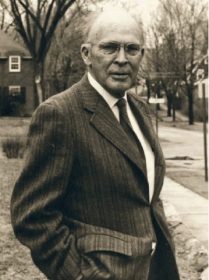Leslie White was an American cultural anthropologist known for his neo-evolutionary viewpoint. White was born in Salida, Colorado, on January 19, 1900 and planned a career in the natural sciences before joining the Navy during World War I. This experience had a profound effect on him shifting his interests from the natural to the social sciences. Following the war, he enrolled at Louisiana State University where he stayed for two years before transferring to Columbia University where he received a master’s degree in psychology. White completed his doctorate at the University of Chicago under Edward Sapir and Fay Cooper-Cole.
 White accepted an appointment at the University of Buffalo in 1927. Following a visit to a nearby Seneca Indian Reservation, White read Lewis Henry Morgan’s League of the Iroquois. Morgan’s evolutionary ideas resonated with White and he read the works of other evolutionary theorists including Herbert Spenser and Edward B. Tylor. White joined the faculty of the University of Michigan following the retirement of Julian Steward in 1930. Despite tensions with other faculty and administration, he stayed at Michigan until his retirement in 1970. During his tenure, the institution was transformed into one of the leading centers for anthropological teaching and research in the country.
White accepted an appointment at the University of Buffalo in 1927. Following a visit to a nearby Seneca Indian Reservation, White read Lewis Henry Morgan’s League of the Iroquois. Morgan’s evolutionary ideas resonated with White and he read the works of other evolutionary theorists including Herbert Spenser and Edward B. Tylor. White joined the faculty of the University of Michigan following the retirement of Julian Steward in 1930. Despite tensions with other faculty and administration, he stayed at Michigan until his retirement in 1970. During his tenure, the institution was transformed into one of the leading centers for anthropological teaching and research in the country.
White became a prolific writer while at Michigan, publishing The Science of Culture (1949), The Evolution of Culture: The Development of Civilization to the Fall of Rome (1959), and The Concept of Culture (1973). The Science of Culture is widely regarded as White’s most important work and outlines his ideas about the relationship between culture, culturology (the scientific study of culture), and cultural evolution. According to White, the primary force in cultural evolution is technology and a culture advances as “the amount of energy harnessed per capita per year increases or as the efficiency or means of controlling energy is increased.” As technology becomes more efficient (and more energy is harnessed), the social structure and ideological norms of the society change accordingly.
In addition to his writings on evolution, White continued his lifelong interest in Lewis Henry Morgan and wrote several volumes on Morgan’s research and life. These include Excerpts From the European Travel Journal of Lewis H. Morgan (1937) and Pioneers in American Anthropology: The Bandelier-Morgan Letters 1837—1883 (1940). He was also an avid field researcher who published several monographs including The Acoma Indians (1932), The Pueblo of San Felipe (1932), and The Pueblo of Santa Ana, New Mexico (1942).
White retired from the University of Michigan in 1970. Following his retirement, White moved to Santa Barbara and continued writing at the University of California. On March 31, 1975, he died of a heart attack. White will be remembered as a “neo-evolutionist” who reintroduced the concept of evolution into anthropological theory.
References:
- Bohannan, P., & Glazer, M. (1988). High points in anthropology. New York: Alfred A. Knopf.
- Marcus, G. E., & Fischer, M. M. J. (1986). Anthropology as cultural critique: An experimental moment in the human sciences. Chicago: University of Chicago Press.
- Morgan, L. H. (1960). The league of the Iroquois. New York: Corinth Books.
- Service, E. (1976). Leslie Alvin White 1900-1975. American Anthropologist, 78, 612-617.
- White, L. A. (1949). The science of culture: A study of man and civilization. New York: Farrar, Straus, and Giroux, Inc.
- White, L. A. (1973). The concept of culture. Minneapolis: Burgess Publishing Company.

